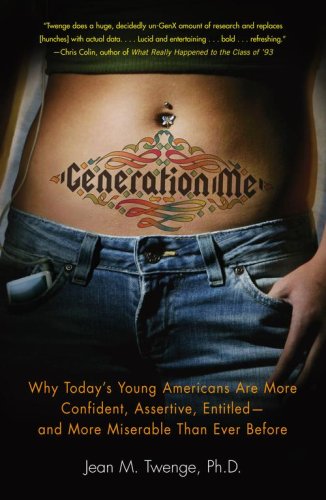All Nonfiction
- Bullying
- Books
- Academic
- Author Interviews
- Celebrity interviews
- College Articles
- College Essays
- Educator of the Year
- Heroes
- Interviews
- Memoir
- Personal Experience
- Sports
- Travel & Culture
All Opinions
- Bullying
- Current Events / Politics
- Discrimination
- Drugs / Alcohol / Smoking
- Entertainment / Celebrities
- Environment
- Love / Relationships
- Movies / Music / TV
- Pop Culture / Trends
- School / College
- Social Issues / Civics
- Spirituality / Religion
- Sports / Hobbies
All Hot Topics
- Bullying
- Community Service
- Environment
- Health
- Letters to the Editor
- Pride & Prejudice
- What Matters
- Back
Summer Guide
- Program Links
- Program Reviews
- Back
College Guide
- College Links
- College Reviews
- College Essays
- College Articles
- Back
Generation Me
A book about my generation. A generation with higher life expectancy, more jobs, individualism, educational opportunities, but a generation with more depression and anxiety. Twenge categorizes anyone born from 1970 to 1990 into this 'Generation Me'. Using research she personally collected and from previous social scientists, Twenge compares GenMe with, primarily, the Baby Boomers. Showing an increase in self esteem and individualism and a decrease in community interaction, Twenge shows all of the negatives of our generation (even though the signs point us towards a bright future) and ends her book with ways to turn us around to keep generation as a whole from 'failing'.
The book is full of facts, and facts, and facts, facts that seem repetitious, and, for most, Twenge unnecessarily repeats facts in different circumstances. But Twenge's sarcastic comments and humorous anecdotes picks up the readers' enjoyment. When the book begins to get dry, Twenge adds a story about her college students or about her personal endeavors. The book hits it's target audience perfectly, talking directly to college students and young adults, all part of Twenge's 'Generation Me'. At points the book makes you rethink your motives, making you pause and question if you fit into the category she's speaking directly about. Other times she speaks broadly about a subject we all are familiar with: following your dreams, sex sells in advertising, lack of political efficacy (because of lack of interest).
The book concludes with telling the reader what to expect, as an employer, employee, and student. Twenge concludes that there's no telling what future generations will be bring, if they will follow the same increase in depression and anxiety, but that we need to be aware of the future. Twenge's book opens the eyes of all of GenMe and their employers and teachers. It makes GenMe-ers revisit their ideals and dreams, and is a good warning for the future.
Similar Articles
JOIN THE DISCUSSION
This article has 0 comments.

